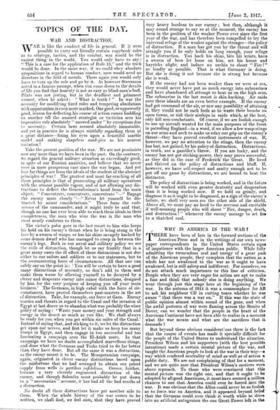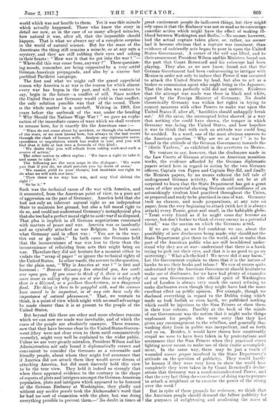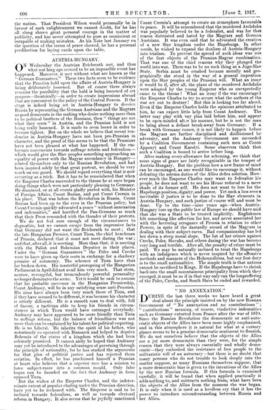WHY IS AMERICA IN THE WAR I THERE have been
of late in the forward sections of the 1. American Press and in the writings of our own news- paper correspondents in the United States certain signs of impatience with the larger American public. While fully admitting the tremendous zeal and energy of a great part of the American people, they complain that the nation as a whole has not awakened to the war as it ought to have awakened, but is still asleep and indifferent. For ourselves, we do not attach much importance to this line of criticism. People when they are very eager for action are apt to make a. fuss and think that nobody else is doing anything. We went through just this stage here at the beginning of the war. In the autumn of 1914 it was a commonplace for AB to ask his neighbour CD in cutting- tones, whether he was aware "..that there was a war on." If this was the state of public opinion almost within sound of the guns, and when the awful portents of war were flaming across the Straits of Dover, can we wonder that the ,people in the heart of the American• Continent have not been able to realize in a moment .what the war means and what are the sacrifices that it demands / But beyond these obvious considerations there is the fact that the course of events has made it specially difficult for the people of the United States to understand the situation. President Wilson and his supporters (with the best possible intentions) made a certain mental picture of the war, and taught the American people to look at the war in their way—a way which rendered neutrality of mind as-well as of action a public duty. We are not complaining of that for a moment, and we are quite sure that President Wilson's motives were above reproach.- To those who were convinced that this mentalpicture was the right one, and that it ought to•be adopteoi by all -good. Americans, it musthave seemed a fmillion chances• to one that America could ever be forced into the war. It was obvious that the Allies could never be so foolish as to force war on America, and it appeared, beyond belief that the Germans could ever think it worth while to drive into an artificial antagonism the one Oreat, Power left in the world whiCh was not hostile to theta: Yet-it was this miracle which actually happened. Those' who. know' the ,story in detail see now, as in the- case • of so -many alleged miracles, how natural it was-, after all, that the -impossible should happen. That is what we always say• of a complete surprise in the world of natural science; But for the mass of the Ainericans the thing still remains a miracle; or at any rate 'a mystery; and they are still rubbing- their eyes and asking hi their hearts : How was it that we got into the -war ? "- "Where did this war come from, anyway ?" These question- ing moods; remember, are being supported by a very artful GermantAmerican -propaganda, and also -by a sincere • but purblind- Pacifieist campaign. The first and what we -might call the 'grand superficial reason why America is -at war is the reason for which almost every war has begun in the past, and will, we venture- to say; begin in the future--a conflict of will. Since neither the United States -nor Germany would -yield in that conflict, the only- solution possible- was that of- the sword. There is the -whole -matter- in a nutshell. Writing-in 1909, five years before. the outbreak of the war, under' the -heading " Why Should the Nations-Wage War? " we gave an expla- nation of the immediate-causes of wars which we shall venture to resume -here, for it exactly fits -the American case :- " Wars do not come about'by-s,ccident, or through the influence of the stare, or no mnn knows how, but always in the last' resort through the clash of -human wills. Analyse any diplomatic .corre- spondence -or negotiation which has ended in war, and you will find that it falls at last into a -formula of this kind : ' We 'destee that you will refrain from taking such-and-such a course of action:' The other-nation -in effect replies : ' We have a right to take it and mean to take it.' The following are the next stops in the dialogue-: We warn yon that. if you do, wo shall prevent you by-force- of arms.' ' We cannot yield' to your threats," but maintain our right to do what we will with our own.'
' Then• there is no way but war, and may God• defend the right !' ' be it.' " Such 'was the technical cause of the war with America, and it amounted, from the American point of view,- to a pure act of aggression on the part of Germany. America -held that- she had not only an inherent natural right as an independent - State 'to maintain her ground. but also a full Moral right to do so,. and -could not understand Germany's metaphysical plea that ehe too had a perfectniaral right to make warif so-disposed. That plea is implicit in all German negotiations concerned. with matters of peace and war. America was as insolently' and -as cynically -attacked as was Belgium. In both cases- what Germany said in effect was : " You are in the way. Get out or go under." In both cases the Germans • heid that the inconvenience of war was less to them. than the inconvenience of refraining from acts that might - bring on war. Therefore they-did not hesitate-for a moment either to violate the "scrap of paper" or ignore the technical rights of the United States. In other words, the answer tothe question, for the plain man, " Why- is America at war ? " is first and foremost : " Because -Germany has attacked you, has made war upon you. If you come- to think of it, there is not -much more sense in askim why you arc at war than in asking why- there is a blizzard, or a perilous thunderstorm, or a dangerous flood. The thing is there to be grappled with, and the reasons have ceased to be important,- or at any- rate have only the importance of natural- phenomena." That, • tee venture to- think, is a point of view which might with no small advantage be made clearer than it is at present to the people of the United • States.
• But beyond this there are other and more obvious reasons which we can now see made war inevitable, and of which the mass of the people. are absolutely unaware. These reasons, now that they have become clear to the United States Govern- ment (they were not clear even to them until comparatively recently), might very well be explained to the wider public. Unless• we are very greatly mistaken, President Wilson and his Administration not only found it diplomatically correct and convenient' to consider- the Germans as- a reasonable and friendly people, about whom- they might feel assurance that if America did not attack them they would never dream of attacking America, but did most sincerely hold this view to -be the true view. They held it indeed so strongly that when there appeared evidence .to the contrary in the shape of reports of plots and intrigues amongst the German-American population, plots-and intrigues which appeared to be fostered at the German Embassy' at Washington, they gladly and without any arriire pens& took the Ambassador's word that heilid no-sort -of- -connexion- with- the-plots, but . was doing everything possible to prevent them.--` No doubt in times of great- excitement people do indiscreet things, but they might rely-upon- it that-the Embassy wee not so mad-as torenoourage anarchic action which- might have the effect of making ill- blood between Washington and Berlin.'—No sooner, however, had the actual rupture taken place, or, rather, . no sooner' had it become obvious that a rupture was imminent, than evidence of unfriendly acts began to pour in upon the-United! States Government. A corner of- the veil- was lifted, and to their amazement President Wilson' and his Ministers found out the 'part that Count Bernstorff and his entourage had been playing. They also, as we now know, found out that the' German -Government had been endeavouring to intrigue with - Mexico in order not only to induce that -Power if war occurred to attack the • United States by land, but also to act. as a broker or commission agent who might bring in the Japanese. That the idea was perfectly wild did not matter. Eyidence that the attempt, was made was there in black , and white, signed by the Foreign Minister of Germany. No doubt' theoretically Germany was within her rights in trying .to concert measures with other Powers to make war upon the United States if, after all, ' hostilities should unhappily break out.' • All the same, the intercepted -letter showed, in a way that nothing else could have shown, the temper in which Germany was facing the United States, and how hopeless it was to think that with such an -attitude war could long, be. avoided. In a word, one of the most obvious answers to the American question " Why are we at war ? " is to be found in the attitude of the German Government towards the " idiotic Yankees," as exhibited in the overtures to Mexico.
We venture to say, however, that the disclosures made in the Law Courts of German attempts- on American- munition works; the evidence afforded by the' German diplomatic papers seized here in regard. to action by the two- German officers, Captain von Papen and Captain Boy-Ed, and finally the Mexican papers, by no means exhaust the full tale of underground- German activity. We should not be at all surprised to learn that. the State Department has got- a• great mass of other material showing German unfriendliness of an astonishingly virulent kind practised throughout- the Union, or prepared and ready to be practised in case of war. Germany took no- chances, and made preparations, at any rate on paper, from the very beginning to attack (with her-it is always attack) every Power, great and small, in the- habitable globe. " Treat every friend as if he might some day become au enemy, but don't bother to think of every enemy as a potential friend," was- the maxim on which the Germans acted.
If we 'are right, as we feel confident wo are, about the possibility of new disclosures being made, why should not the State. Department give them to the world, and so make that part of the American public who are still bewildered under- stand why they are at war--understand that there is a hawk trying to pick -out their eyes, and that it is no good to ga on muttering: " What ails the bird We never did it any harm." Let the Government explain to them that it is the nature of hawks to use their beaks and talons ? We can of course quite understand why the American Government should. hesitate to make use of disclosures, for we have had plenty of examples of our own Government (the official spirit of Washington and of London is always very much the same) refusing to make disclosures even though they might have had the most excellent effect on public opinion. For example, though we. disclosed everything in regard to the Dublin rising• which. made us look foolish or even harsh, we published nothing which could be injurious to the Sinn Feiners or show them in their true. colours. Possibly at the back of the minds of our Government was the notion that it might make things unpleasant for people who were sorry that they had given any encouragement to the rebellion, and generally that washing dirty- linen in public was inexpedient, and so forth and so on. Besides, it would have shown how unutterably stupid we were to have been taken in by protestations and assurances that the Sinn Feiners when they practised street fighting never meant to make. use of their exotic accomplish- ment. In the same way, there may be just a touch of wounded amour propre involved in the State Department's attitude on the question of publicity. They would hardly be human if they were very keen to show the world how completely they were taken in by Count Bernstorff's declar- ations that Germany was a much-misunderstood Power, aiel that the very last thing she ever dreamt of doing was to prepare to. attack- a neighbour or to exercise the power of the strong over the weak !
But in spite. of these grounds for reticence, we think that the American people should demand the fullest publicity for the purposes of enlightening and awakening the mass of the nation. That President Wilson would personally be in favour of such enlightenment we cannot doubt, for he has all along shown great personal courage in the matter of publicity, and has never attempted to pose as omniscient or incapable of making mistakes. As his Note last January en the question of the terms of peace showed, he has a personal predilection for laying cards upon the table.




























 Previous page
Previous page